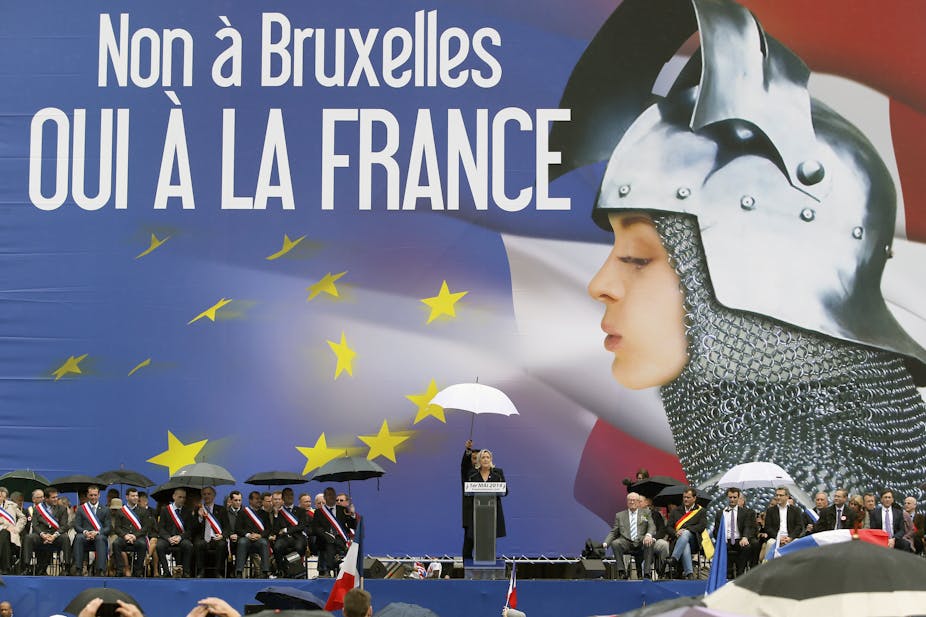It is widely predicted that far-right parties will be the big winners of the 2014 European elections. Some polls have even suggested that the French Front National, the Dutch Party for Freedom, the Austrian Freedom Party, the Danish People’s Party and the UK Independence Party could be the winning parties in their respective countries.
This is hardly surprising as the rise of these populist, nativist movements has taken place in extremely favourable circumstances. Secondary elections have always proven beneficial for parties beyond the mainstream. The Eurosceptic side, whether opportunistic or ideological, is able to run an “easy” negative campaign, attacking institutions which the public doesn’t properly understand and in which it is not very interested.
The economic situation is also favourable for far-right parties as mainstream parties on both left and right have been forced to embrace painful austerity measures. While there are signs of recovery, many countries are still suffering from the aftermath of the economic crisis and mid- to long-term forecasts are no cause for optimism.
In late 2013, in contrast to early signs of economic recovery touted by governments, 68% of respondents in the latest Eurobarometer survey said the current situation in their country was bad and 50% felt that worse was still to come. In such a context, an exclusionary nationalistic alternative would logically appeal to some of those anxious about their present situation.
In their appeal to those most anxious within our societies, these parties have been helped by constant and disproportionate media coverage. While the media is rarely favourable to the cause of populist nativist parties, the excessive coverage reinforces their legitimacy. This has been particularly striking recently in France and the UK, where Marine Le Pen and Nigel Farage have become common features of prime-time television and newspaper front pages.
In France, the coverage of the local elections commonly referred to the “shock” caused by the Front National’s performance. This was despite some relatively ordinary results compared to previous elections, which demonstrated the inability of the FN to grow, even in a favourable context. The coverage of the elections also rarely took into account that the FN was unable to put forward more candidates and win more seats despite them having been carefully targeted, demonstrating further the limits of the party’s reach. Similarly, Nigel Farage and UKIP have attracted “historically unprecedented levels of coverage for a minor party” despite the fact they have no MPs in Westminster.
Populist nativist parties have also been helped to grow larger by the normalisation of much of their discourse – what would have been considered 20 years ago to be racist and unacceptable has now become political “common sense”. Governments and oppositions have taken to shamelessly blaming immigration and/or Islam for all ills in our societies. Even though only 7% to 12% of Eurobarometer respondents placed immigration among the two main issues facing their countries between 2010 and 2013, the topic has been – again disproportionately – prominent in both the media and elite discourse.
All things considered, the far right (in all its diversity) should benefit from extremely favourable circumstances in the upcoming elections.
Flash in the pan …
Yet, despite much of the media’s frenzy, populist nativist parties have so far failed to make strong and consistent gains in recent years and it is unlikely that the upcoming European elections will see a change in this. If we are to trust opinion polls, while these parties will fare well in terms of their percentage of the number of votes cast, it is much less certain that they will succeed in bringing vast swaths of registered voters to their side.

In fact, it was ironic to see Marine Le Pen complain about the threat of abstention among the electorate, clearly demonstrating that she is not the most obvious alternative to the discontented and she suffers from a similar lack of trust to that of her mainstream opponents.
Indeed, in France and the UK far right parties are unlikely to attract more than 10% of registered voters, something much less impressive than the ‘electoral earthquakes’ the media is predicting, and will most likely report on their front pages.

Besides, were they to win the elections, it is unlikely that these parties could form a coherent force within the European parliament as they base their politics on very different platforms: the Front National is very different from UKIP, UKIP is not the Dutch Freedom Party, and so on. (Another irony is in their denunciation of each other as the extremist force they claim they are not.)
… or deeper democratic malaise?
But while it’s unlikely that the far right will gain direct or real power in the short term, the disproportionate focus on their performance will reinforce them, for some people, as a “natural” alternative to the loathed elite. This will be at the expense of other parties and movements which are also growing, but are given little space in the public discourse.
As a reaction, the political elite will convince themselves they must borrow more ideas and rhetoric from the far right. This will lead to the widening of the gap between a self-righteous political elite, blaming opposition to their politics and policies on an irrational mass, and the people for whom the political offer does not match their hopes and fears.
The lopsided coverage will therefore obscure the more dramatic crisis of democracy which has been brewing since the 1980s in Europe. This neglect of the record levels of abstention and distrust in parliamentary politics – whether mainstream or extreme – will be at the expense of the democratic ideals of Europe.
As anger and disillusionment in the parliamentary system reach new heights, the focus on the far right seems more like a decoy, than the search for a solution to the real threat to our European future – distrust of the overall system.

